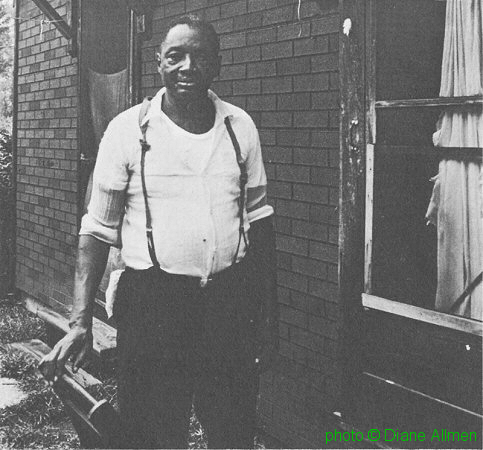BLIND TEDDY DARBY (II)
Theodore Roosevelt Darby, better known as Blind Teddy Darby (March 2, 1906 – December 1975), was an American blues singer and guitarist.
Darby was born in Henderson, Kentucky. He moved to St. Louis with his family when he was a child. His mother taught him to play the guitar. He served some time for selling moonshine. In 1926 he lost his eyesight because of glaucoma.
He recorded from 1929 until 1937 under the names Blind Teddy Darby, Blind Darby, Blind Blues Darby and Blind Squire Turner for Paramount, Victor, Bluebird, Vocalion and Decca. In 1960 he was "rediscovered" and recorded by Pete Welding of Testament Records, but the recordings from this session were never released.
Darby was a friend of the blues musician Peetie Wheatstraw. On December 21, 1941, Wheatstraw's 39th birthday, Darby was invited to go for a drive with Wheatstraw and two others, but Darby's wife objected, and he declined the invitation. Wheatstraw and his two companions were killed when their car struck a standing freight train.
In the late 1930s he gave up the blues and became an ordained deacon.
His song "Built Right on the Ground" has been covered (under the title of "I Never Cried"), from the 1970s onwards, by John Miller (who first changed the title), Roy Book Binder, Howard Bursen, and Phil Heywood.
Artist Biography by Bruce Eder in allmusic
Theodore Roosevelt Darby, better known as Teddy Darby and sometimes known as "Blind Darby," and also known as Blind Squire Turner, was born in Kentucky but raised in Indiana then in St. Louis, Missouri. His mother taught him the guitar as a boy, but it was never his intention to make a career out of music. In fact, he was making a living as a bootlegger after Prohibition passed, and it was only during a sentence doing time in a local workhouse that he kept busy with the guitar. Darby was blinded at age 20 by glaucoma, and the guitar became his livelihood. He made a living playing for tips at parties, on streets, in clubs and in bars during the '20s and '30s.
Darby accompanied Peetie Wheatstraw on occasion, and was often accompanied at his own performances at bars, clubs, and dances by his cousin, Tommy Webb, who played barrelhouse-style piano. Beginning in 1929 with a quartet of songs, "Lose Your Mind," "My Laona Blues," "Lawdy Lawdy Worried Blues," and "What Am I to Do," the two also recorded together. According to some sources, he recorded as "Blind Squire Turner" late in 1933 to help out a friend named Turner, who was trying to impress a member of the fairer sex by claiming to have a record out. Darby's sound was a mix of rural and urban influences, his country blues guitar meshing well with Webb's more urban, St. Louis-based piano style, and his singing reflecting the influence of the city he called home. It was powerful music, reflecting a nimble, dexterous approach to the guitar and bold piano riffs, and passionate, affecting vocals. Darby continued to record until 1937, but his career in blues ended when Tommy Webb was stabbed to death, reportedly over a pack of cigarettes. The combined loss of his cousin and partner, coupled with his disillusionment, caused him to renounce the music and the life of a bluesman. He became an ordained minister known as Preacher Darby.
Más info del artista en ES BLUES !
---------------oOo-----------------------





Comments